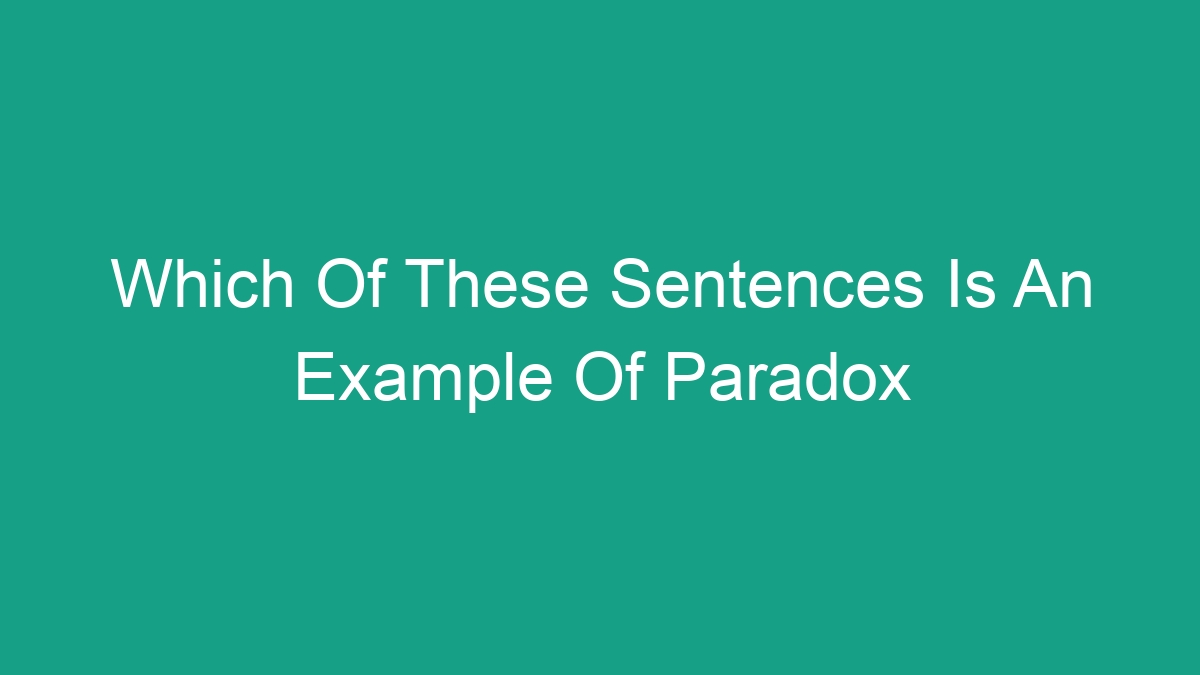
Understanding Paradox
Before we delve into identifying examples of paradoxical sentences, it’s important to first understand what a paradox is. A paradox is a statement that appears to be self-contradictory or illogical, but upon further examination or contemplation, may prove to be true or at least contain an element of truth.
In literature and philosophy, paradoxes are often used to highlight and explore complex ideas, challenge conventional thinking, and create thought-provoking or provocative discourse.
Identifying a Paradox
Identifying a paradox often requires careful scrutiny of the language used and the underlying meaning of the statement. Here are some key characteristics of a paradox:
- Apparent contradiction: A paradox may initially seem to contradict itself or defy logical reasoning.
- Truth or insight: Despite its apparent contradiction, a paradox may reveal an underlying truth or insight upon closer examination.
- Provokes thought: Paradoxes are designed to provoke thought and challenge perceptions, often leading to deeper contemplation and understanding.
Examples of Paradoxical Sentences
Now that we have a better understanding of what a paradox is, let’s explore some examples of paradoxical sentences and analyze why they fit the definition of a paradox:
- “This statement is false.”
- “Less is more.”
- “The beginning of the end.”
- “It’s weird not to be weird.”
One classic example of a paradox, this sentence asserts that it is false, creating a loop of contradictory logic. If the statement is true, then it must be false, but if it is false, then it must be true. This paradox challenges the concept of truth and falsehood, leading to a deadlock in logical reasoning.
This paradoxical statement suggests that having less of something can actually result in a greater or more impactful outcome. It challenges the conventional notion that more is always better, prompting a reevaluation of the relationship between quantity and quality.
This phrase conveys the idea that the initial stages of a process or event mark the eventual decline or conclusion. It encompasses both the notion of a new beginning and an impending conclusion, creating a paradoxical juxtaposition of opposing concepts within a single expression.
This sentence implies that being normal or conforming to societal expectations is actually considered weird or abnormal in itself. It challenges the idea of what is truly considered normal and questions the concept of normalcy in a thought-provoking manner.
Usage of Paradoxes in Literature and Philosophy
Paradoxes have been extensively utilized in literature and philosophy to convey complex ideas, provoke critical thinking, and create intellectual discourse. Here are some notable examples of how paradoxes are employed in these domains:
- Literary Works: Writers often use paradoxes to create memorable and impactful expressions, inject depth and complexity into their narratives, and challenge readers to contemplate deeper truths.
- Philosophical Concepts: Philosophers employ paradoxes to explore abstract concepts, question established beliefs, and stimulate intellectual inquiry. Paradoxes play a crucial role in philosophical discourse by challenging traditional thinking and inspiring new perspectives.
The Significance of Paradoxes
Paradoxes hold significant importance in various disciplines and contexts due to the following reasons:
- Cognitive Engagement: Paradoxes engage the mind and prompt individuals to think critically, leading to enhanced cognitive engagement and intellectual stimulation.
- Conceptual Exploration: By juxtaposing contradictions and challenging conventional notions, paradoxes serve as tools for exploring complex concepts and uncovering deeper truths.
- Creative Expression: In creative and artistic endeavors, paradoxes offer a means of expressing profound ideas and evoking emotional responses through linguistic and conceptual nuances.
Conclusion
In conclusion, identifying examples of paradoxical sentences involves recognizing apparent contradictions that hold underlying truths or insights. Through careful examination, these paradoxes serve to challenge conventional thinking, provoke thought, and stimulate intellectual engagement. Paradoxes find widespread use in literature, philosophy, and various other disciplines, contributing to the exploration of complex ideas and the evolution of intellectual discourse.
FAQs
Q: Are paradoxes always logically sound?
A: While paradoxes may defy traditional logic at first glance, they often contain elements of truth or profound insights when analyzed in depth. They may challenge conventional reasoning but can lead to new perspectives and understandings.
Q: Can paradoxes be found in everyday language?
A: Yes, paradoxes can manifest in everyday language through expressions, sayings, and philosophical reflections. Their presence in common discourse adds depth and complexity to communication and can spark contemplation on seemingly contradictory ideas.



